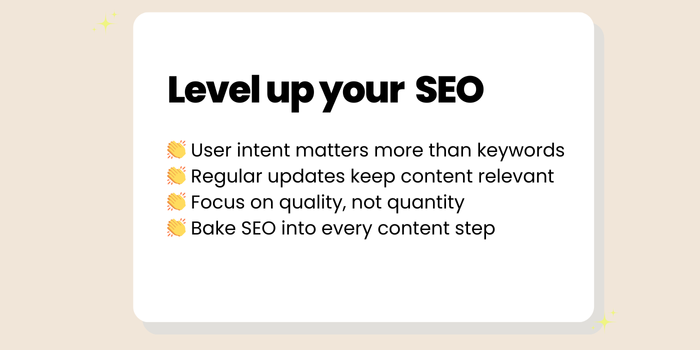How I expanded my SEO knowledge for 2025 content planning
I’ve always been in the 'I write for humans, not algorithms' camp—but over the last year, I’ve realized that doesn’t mean ignoring SEO. Content needs are evolving, and search engines are becoming more advanced, pushing the two worlds closer together. Writing for both humans and search engines isn’t just possible—it’s essential.
That’s why I decided to get proactive about my SEO knowledge. I attended SEO webinars with experts like Bernard Huang, Andy Crestodina, and SEMrush. Here’s what I’m taking into 2025 and how I plan to bake SEO into my content strategy.
1. User intent is everything
The idea everyone misses:
Many think SEO is just about keywords, but the truth is, search engines are increasingly prioritizing content that addresses the actual needs and problems of real people. It’s no longer about gaming the system but providing genuine solutions.
How I’m going to implement it:
In every piece of content, I now start with user intent—what is the reader looking for? What problem am I helping them solve? Shifting my mindset from focusing solely on keyword volume to user intent has made my content more valuable and aligned with search engine updates.
2. Content updates matter
How I plan on staying ahead:
One of the key insights I gained is that Google rewards fresh, regularly updated content. Our resources can’t just exist—they need to evolve with the industry and stay valuable to our audience. Stale content gets left behind, while updates can bring new traffic.
Step-by-step approach:
I’m going to audit on a quarterly basis to make sure high-performing and high-potential content is up-to-date.
I’m looking for SEO red flags like high impressions with no clicks, keywords that haven’t moved up in 6 months or loss of keyword rankings in the last 6 months.
Then, I’m going to reframe content based on current trends or changes in the industry. This is where things like updating meta descriptions, internal linking, adding visuals/multimedia content and just generally improving the reader experience happens.
This keeps content relevant and signals to search engines that it’s still valuable to users.
3. Less is more: Focus on quality over quantity
What I learned:
One of the biggest shifts I’ve noticed is the move toward creating high-quality, sustainable content rather than flooding the web with low-value posts. I’m glad to see this trend because there are only so many articles I can read in a day, and I’m at my desk. Imagine what non-desk audiences feel like.
How I’m taking this with into next year:
Instead of focusing on churning out content for volume, I now prioritize pieces that provide deep value and are built to last. Every blog post, case study, or resource I create is designed to address specific audience needs with a long shelf life. This strategy not only helps with SEO but ensures that the content remains impactful over time.
4. Moving beyond the fundamentals: SEO isn’t just on-page
Stepping out of my comfort zone:
For a while, I thought knowing the fundamentals of on-page SEO—like meta descriptions, keyword density, and alt text—was enough. But with everything that’s happened in the last year, I’ve learned that SEO requires a more broader view and approach. Staying in my comfort zone won’t cut it anymore!
How I’m levelling up:
I started exploring deeper topics, from technical SEO to backlink strategies and core web vitals. This is helping me make sure that our content wasn’t just optimized for the basics but was performing across all SEO fronts. It’s not just about adding SEO at the end—it’s about baking it into every step of content creation.
SEO isn’t something you just tack on
It’s something you integrate into your content from the start. As a content marketer, I’ll always prioritize writing for humans first. But now, I’m better equipped to ensure that search engines don’t miss the value we’re delivering.
Going into 2025, my content strategy will focus on user intent, content longevity, and maintaining high standards for quality over quantity. Staying proactive about SEO means I can continue to provide value to both readers and search engines—making sure our content doesn’t just perform, but thrives.
